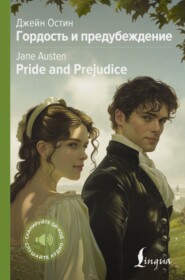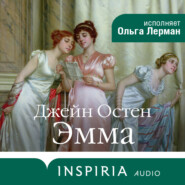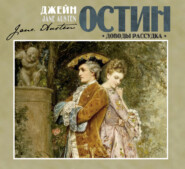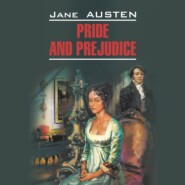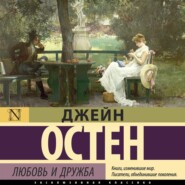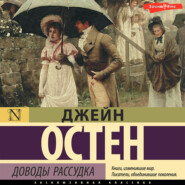По всем вопросам обращайтесь на: info@litportal.ru
(©) 2003-2025.
✖
Эмма. Уровень 3 / Emma
Настройки чтения
Размер шрифта
Высота строк
Поля
“Nonsense, nonsense!” cried Mr. Knightley. “Robert Martin's manners have sense, sincerity, and good-humour to recommend them; and his mind has more true gentility than Harriet Smith could understand.”
Emma made no answer, and tried to look unconcerned, but was really feeling uncomfortable and wanting him very much to be gone. She did not regret what she had done; she had respect for his judgment in general. He was sitting just opposite to her in angry state, and that was very unpleasant. Some minutes passed in silence, with only one attempt on Emma's side to talk of the weather, but he made no answer. He was thinking. The result of his thoughts appeared at last in these words.
“Robert Martin has no great loss[43 - has no great loss – не много потерял]; but you make no secret of your love of match-making, and as a friend I shall just hint to you that if Elton is the man, I think it will be all in vain.”
Emma laughed. He continued,
“Elton is a very good sort of man, and a very respectable vicar of Highbury, but not at all likely to make an imprudent match. He knows the value of a good income as well as anybody. Elton may talk sentimentally, but he will act rationally.”
“I am very much obliged to you,” said Emma. “but at present I only want to keep Harriet to myself.”
“Good morning to you,” said he, rising and walking off abruptly. Emma remained in a state of vexation too.
Harriet's cheerful look and manner calmed Emma: she came back, not to think of Mr. Martin, but to talk of Mr. Elton.
Chapter IX
Mr. Knightley might quarrel with her, but Emma could not quarrel with herself. He was so much displeased, that when they met again, his grave looks showed that she was not forgiven. She was sorry, but could not apologise for what she did not regret.
The picture, elegantly framed, came safely to hand soon after Mr. Elton's return, and was hung over the mantelpiece of the common sitting.
“You and Mr. Elton are by situation called together[44 - by situation called together – предназначены друг другу],” said Emma to Harriet; “you belong to one another by every circumstance of your respective homes. Your marrying will be equal to the match at Randalls.”
“That Mr. Elton should really be in love with me, me, of all people! And he, the most handsome man that ever was, and a man that everybody looks up to, quite like Mr. Knightley! And so excellent in the Church! Dear me! When I look back to the first time I saw him! How little did I think!”
“This is an alliance which, whoever-whatever your friends may be, must be agreeable to them, provided at least they have common sense. If they are anxious to see you happily married, here is a man whose amiable character gives every assurance of it.”
“Yes, very true. How nicely you talk; I love to hear you. You understand everything. You and Mr. Elton are one as clever as the other.”
Chapter X
Though now the middle of December, there had yet been no weather to prevent the young ladies from tolerably regular exercise; and Emma had a charitable visit to pay to a poor sick family, who lived a little way out of Highbury.
Their road was down Vicarage Lane[45 - Vicarage Lane – Пастырская дорога], containing the blessed abode of Mr. Elton. Emma's remark was-
“There it is. There you will go some day.”
Harriet's was-
“Oh, what a sweet house! – How beautiful! – There are the yellow curtains that Miss Nash admires so much.”
“I do not often walk this way now,” said Emma, as they went further, “but then there will be a reason to.”
Harriet said,
“I do so wonder, Miss Woodhouse, that you should not be married, or going to be married! so charming as you are!”
Emma laughed, and replied,
“If I am charming, Harriet, it is not quite enough to marry; I must find other people charming-one other person at least. And I am not only not going to be married, at present, but have very little intention of ever marrying at all.”
“Ah! – so you say; but I cannot believe it.”
“I must see somebody very superior to anyone I have seen yet, to be tempted; Mr. Elton, you know, is out of the question: and I do not wish to see any such person. I would rather not be tempted. If I were to marry, I must expect to regret it.”
“Dear me! – it is so odd to hear a woman talk so!”
“I have none of the usual inducements[46 - inducement – мотив] of women to marry. Were I to fall in love, indeed, it would be a different thing! but I never have been in love; it is not my way, or my nature; and I do not think I ever shall. And, without love, I am sure I should be a fool to change such a situation as mine. Fortune I do not want; employment I do not want; consequence I do not want: I believe few married women are half as much mistress of their husband's house as I am of Hartfield; and never, never could I expect to be so truly beloved and important in any man's eyes as I am in my father's.”
“But then, to be an old maid at last, like Miss Bates!”
“That is a terrible image, Harriet; and if I thought I should ever be like Miss Bates! so silly-so satisfied-so smiling-I would marry tomorrow.”
“But still, you will be an old maid! and that's so dreadful!”
“Never mind, Harriet, I shall not be a poor old maid! A single woman, with a very narrow income, must be a ridiculous, disagreeable old maid! But a single woman, of good fortune, is always respectable, and may be as sensible and pleasant as anybody else. This does not apply, however, to Miss Bates; she is only too good natured and too silly to suit me; but, in general, she is very much to the taste of everybody, though single and though poor. Poverty certainly has not affected her mind.”
“Dear me! but what shall you do? how shall you employ yourself when you grow old?”
“If I know myself, Harriet, mine is an active, busy mind, with a great many independent resources; and I do not perceive why I should be more in want of employment at forty or fifty than one-and-twenty. Woman's usual occupations will be as open to me then as they are now. If I draw less, I shall read more; if I give up music, I shall take to carpet-work. I shall be very well off, with all the children of a sister I love so much, to care about. My nephews and nieces! – I shall often have a niece with me.”
“Do you know Miss Bates's niece? That is, I know you must have seen her a hundred times-but are you acquainted?”
“Oh! yes; Jane Fairfax[47 - Jane Fairfax – Джейн Фэрфакс]. Every letter from her is read forty times over; her compliments to all friends go round and round again. I wish Jane Fairfax very well; but she tires me to death.”
Harriet could just answer, “Oh! yes, yes,” before Mr. Elton joined them. They now walked on together quietly, when a sudden resolution of getting Harriet into the house, made Emma find something wrong about her boot. She broke the lace off short, and dexterously throwing it into a ditch, had to ask them about stopping.
“Part of my lace is gone,” said she, “and I do not know how I am to go further. I really am a most troublesome companion to you both. Mr. Elton, I must beg leave to stop at your house, and ask your housekeeper for a bit of ribbon or string, or anything just to keep my boot on.”
Mr. Elton looked all happiness at this proposition; and led them into the house with all the alertness and attention anyone could imagine. Emma went after the housekeeper and left Mr. Elton and Harriet alone in the adjacent[48 - adjacent – смежная] room; the door between them was open. Emma had to leave the door ajar as she found it; but she fully intended that Mr. Elton should close it. It was not closed, however, it still remained ajar. For ten minutes she could hear nothing but herself. She was then obliged to be finished, and make her appearance.
The lovers were standing together at one of the windows. He had been most agreeable, most delightful, and he had told Harriet nothing serious.
“Cautious, very cautious,” thought Emma; “he advances inch by inch.”
Chapter XI
Mr. Elton must now be left to himself. It was no longer in Emma's power to superintend his happiness. The coming of her sister's family was so very near at hand, that it became from that point on her main object of interest.
Mr. Woodhouse was now most nervously and apprehensively happy. He was looking forward to Isabella's visiting. He thought much of the troubles the journey might cause her. Mrs. Knightley was a pretty, elegant little woman, of gentle, quiet manners, and a disposition remarkably amiable and affectionate; a devoted wife, a good mother, and so tenderly attached to her father and sister that a warmer love might have seemed impossible. She could never see a fault in any of them.
Emma made no answer, and tried to look unconcerned, but was really feeling uncomfortable and wanting him very much to be gone. She did not regret what she had done; she had respect for his judgment in general. He was sitting just opposite to her in angry state, and that was very unpleasant. Some minutes passed in silence, with only one attempt on Emma's side to talk of the weather, but he made no answer. He was thinking. The result of his thoughts appeared at last in these words.
“Robert Martin has no great loss[43 - has no great loss – не много потерял]; but you make no secret of your love of match-making, and as a friend I shall just hint to you that if Elton is the man, I think it will be all in vain.”
Emma laughed. He continued,
“Elton is a very good sort of man, and a very respectable vicar of Highbury, but not at all likely to make an imprudent match. He knows the value of a good income as well as anybody. Elton may talk sentimentally, but he will act rationally.”
“I am very much obliged to you,” said Emma. “but at present I only want to keep Harriet to myself.”
“Good morning to you,” said he, rising and walking off abruptly. Emma remained in a state of vexation too.
Harriet's cheerful look and manner calmed Emma: she came back, not to think of Mr. Martin, but to talk of Mr. Elton.
Chapter IX
Mr. Knightley might quarrel with her, but Emma could not quarrel with herself. He was so much displeased, that when they met again, his grave looks showed that she was not forgiven. She was sorry, but could not apologise for what she did not regret.
The picture, elegantly framed, came safely to hand soon after Mr. Elton's return, and was hung over the mantelpiece of the common sitting.
“You and Mr. Elton are by situation called together[44 - by situation called together – предназначены друг другу],” said Emma to Harriet; “you belong to one another by every circumstance of your respective homes. Your marrying will be equal to the match at Randalls.”
“That Mr. Elton should really be in love with me, me, of all people! And he, the most handsome man that ever was, and a man that everybody looks up to, quite like Mr. Knightley! And so excellent in the Church! Dear me! When I look back to the first time I saw him! How little did I think!”
“This is an alliance which, whoever-whatever your friends may be, must be agreeable to them, provided at least they have common sense. If they are anxious to see you happily married, here is a man whose amiable character gives every assurance of it.”
“Yes, very true. How nicely you talk; I love to hear you. You understand everything. You and Mr. Elton are one as clever as the other.”
Chapter X
Though now the middle of December, there had yet been no weather to prevent the young ladies from tolerably regular exercise; and Emma had a charitable visit to pay to a poor sick family, who lived a little way out of Highbury.
Their road was down Vicarage Lane[45 - Vicarage Lane – Пастырская дорога], containing the blessed abode of Mr. Elton. Emma's remark was-
“There it is. There you will go some day.”
Harriet's was-
“Oh, what a sweet house! – How beautiful! – There are the yellow curtains that Miss Nash admires so much.”
“I do not often walk this way now,” said Emma, as they went further, “but then there will be a reason to.”
Harriet said,
“I do so wonder, Miss Woodhouse, that you should not be married, or going to be married! so charming as you are!”
Emma laughed, and replied,
“If I am charming, Harriet, it is not quite enough to marry; I must find other people charming-one other person at least. And I am not only not going to be married, at present, but have very little intention of ever marrying at all.”
“Ah! – so you say; but I cannot believe it.”
“I must see somebody very superior to anyone I have seen yet, to be tempted; Mr. Elton, you know, is out of the question: and I do not wish to see any such person. I would rather not be tempted. If I were to marry, I must expect to regret it.”
“Dear me! – it is so odd to hear a woman talk so!”
“I have none of the usual inducements[46 - inducement – мотив] of women to marry. Were I to fall in love, indeed, it would be a different thing! but I never have been in love; it is not my way, or my nature; and I do not think I ever shall. And, without love, I am sure I should be a fool to change such a situation as mine. Fortune I do not want; employment I do not want; consequence I do not want: I believe few married women are half as much mistress of their husband's house as I am of Hartfield; and never, never could I expect to be so truly beloved and important in any man's eyes as I am in my father's.”
“But then, to be an old maid at last, like Miss Bates!”
“That is a terrible image, Harriet; and if I thought I should ever be like Miss Bates! so silly-so satisfied-so smiling-I would marry tomorrow.”
“But still, you will be an old maid! and that's so dreadful!”
“Never mind, Harriet, I shall not be a poor old maid! A single woman, with a very narrow income, must be a ridiculous, disagreeable old maid! But a single woman, of good fortune, is always respectable, and may be as sensible and pleasant as anybody else. This does not apply, however, to Miss Bates; she is only too good natured and too silly to suit me; but, in general, she is very much to the taste of everybody, though single and though poor. Poverty certainly has not affected her mind.”
“Dear me! but what shall you do? how shall you employ yourself when you grow old?”
“If I know myself, Harriet, mine is an active, busy mind, with a great many independent resources; and I do not perceive why I should be more in want of employment at forty or fifty than one-and-twenty. Woman's usual occupations will be as open to me then as they are now. If I draw less, I shall read more; if I give up music, I shall take to carpet-work. I shall be very well off, with all the children of a sister I love so much, to care about. My nephews and nieces! – I shall often have a niece with me.”
“Do you know Miss Bates's niece? That is, I know you must have seen her a hundred times-but are you acquainted?”
“Oh! yes; Jane Fairfax[47 - Jane Fairfax – Джейн Фэрфакс]. Every letter from her is read forty times over; her compliments to all friends go round and round again. I wish Jane Fairfax very well; but she tires me to death.”
Harriet could just answer, “Oh! yes, yes,” before Mr. Elton joined them. They now walked on together quietly, when a sudden resolution of getting Harriet into the house, made Emma find something wrong about her boot. She broke the lace off short, and dexterously throwing it into a ditch, had to ask them about stopping.
“Part of my lace is gone,” said she, “and I do not know how I am to go further. I really am a most troublesome companion to you both. Mr. Elton, I must beg leave to stop at your house, and ask your housekeeper for a bit of ribbon or string, or anything just to keep my boot on.”
Mr. Elton looked all happiness at this proposition; and led them into the house with all the alertness and attention anyone could imagine. Emma went after the housekeeper and left Mr. Elton and Harriet alone in the adjacent[48 - adjacent – смежная] room; the door between them was open. Emma had to leave the door ajar as she found it; but she fully intended that Mr. Elton should close it. It was not closed, however, it still remained ajar. For ten minutes she could hear nothing but herself. She was then obliged to be finished, and make her appearance.
The lovers were standing together at one of the windows. He had been most agreeable, most delightful, and he had told Harriet nothing serious.
“Cautious, very cautious,” thought Emma; “he advances inch by inch.”
Chapter XI
Mr. Elton must now be left to himself. It was no longer in Emma's power to superintend his happiness. The coming of her sister's family was so very near at hand, that it became from that point on her main object of interest.
Mr. Woodhouse was now most nervously and apprehensively happy. He was looking forward to Isabella's visiting. He thought much of the troubles the journey might cause her. Mrs. Knightley was a pretty, elegant little woman, of gentle, quiet manners, and a disposition remarkably amiable and affectionate; a devoted wife, a good mother, and so tenderly attached to her father and sister that a warmer love might have seemed impossible. She could never see a fault in any of them.
Вы ознакомились с фрагментом книги.
Приобретайте полный текст книги у нашего партнера:
Приобретайте полный текст книги у нашего партнера:










